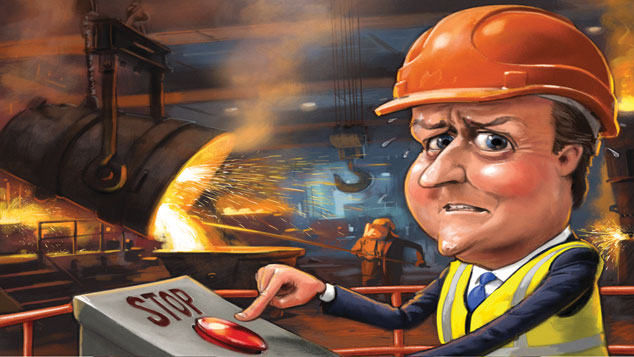
This week in MoneyWeek magazine, we take a look at how politics is becoming increasingly intrusive, and how it’s something that investors really need to be aware of.
“For a long time”, says John Stepek in his editor’s letter, “the received wisdom was that politics didn’t matter. While politicians squabbled, businesses could get on with making money.”
Now, though, things have changed. The problems with Britain’s steel industry are rooted in politics, he says, what with “green” taxes driving up energy costs, and China’s command economy flooding the world with its surplus steel.
We look at the problems facing the industry this week. If you want to find out more, take out a subscription to the magazine.
The cycle of destruction and creation: a normal, healthy process
“Throwing public money” at dying industries isn’t the answer, says Matthew Lynn in his City View column, as he looks at the broader state of the Welsh economy.
With the future of the Port Talbot steelworks in doubt and public sector cuts ravaging an economy heavily dependent on state spending, “you’d think Wales was turning into another Greece”. But in fact, “the Welsh economy is doing perfectly well”, he says.
There’s plenty of evidence that Wales is “finding new opportunities to replace dying industries”. Aston Martin and TVR are to make their new models there, for example. The “cycle of destruction and creation” is “part of a normal process in a healthy economy”, says Matthew.
But “keeping old steel mills going” won’t do anything to benefit the country in the long term, he says.
Is it time to buy oil stocks?
Our big feature this week is on the oil sector. It looks like the oil price might have bottomed. But “is this the investment opportunity of the decade?” asks David C Stevenson, “or is it just a value trap, luring us in before prices fall even lower?”
David looks at the case for the bulls and the case for the bears. And, while investors need to tread carefully and be patient, this could be a good time to start buying stocks.
But investing in oil is by no means an easy ride, says Charlie Morris, who’s a little more nervous. When he took over as investment director of the Fleet Street Letter, the first trade he made was to buy oil stocks. “Of all the trades that I’ve recommended”, he says, “this is the one that keeps me awake at night”.
Find out why, and the basket of energy stocks that David recommends, with take out a subscription to the magazine.
How to give yourself a “margin of safety” when picking stocks
If you’re a “value” investor, you look to buy stocks that are selling at a big discount to the “intrinsic value”. That way, says Matthew Partridge, if the market tanks or the economy slows, you’ve got a built-in buffer. That’s fair enough, but how do you know if a share is undervalued. “You need to work out what its actual fair value should be”, says Matthew. To find out how to do that, you’ll have to read the magazine.
Leap into fish-farm stocks
Stocks in salmon farms are leaping ahead, if you’ll pardon the pun. It’s all to do with algal blooms of the coast of Chile destroying stocks and driving up prices. So this week on his shares page, Alex Williams looks at “smart fish farms”, and picks one producer that’s doing very nicely. For the more daring investor, he also picks a risky iron ore miner for his “gamble of the week”, plus, of course, we have a roundup of the best tips from the rest of the financial media.
In the funds section, Sarah Moore looks at investing in Vietnam. It’s “one of the most promising economies in southeast Asia”, she says, and is a good bet for the long term. If you want to find out how to buy in, take out a subscription to the magazine.
Cutting the cost of a university education
For English students, getting through university is a costly business these days. “A three-year degree can end up costing as much as £75,000”, says Sarah. She looks at ways of softening the blow, from scholarships, grants and other financial incentives, to alternative studying arrangements such as heading abroad.
Another blow for young people comes with the latest reforms to the state pension, says Natalie Stanton. The changes mean that “75% percent of people in their 20s will lose an average of £19,000 over the course of their retirement”. Natalie also round up the latest property market news. She looks at the new “house-price hotspots”, and warns of trouble brewing in the commercial property sector.
Elsewhere, we have a briefing on the living wage – it’s all very nice in theory, but how will it affect the wider economy? Plus, Chris Carter runs his eye over four of the best cruise holidays to take this year – from a gastro-cruise around the Med to eco-yachting in the Galapagos – and we have eight of the best luxury penthouses on the market now.
If that sounds like your sort of thing, take out a subscription to the magazine.